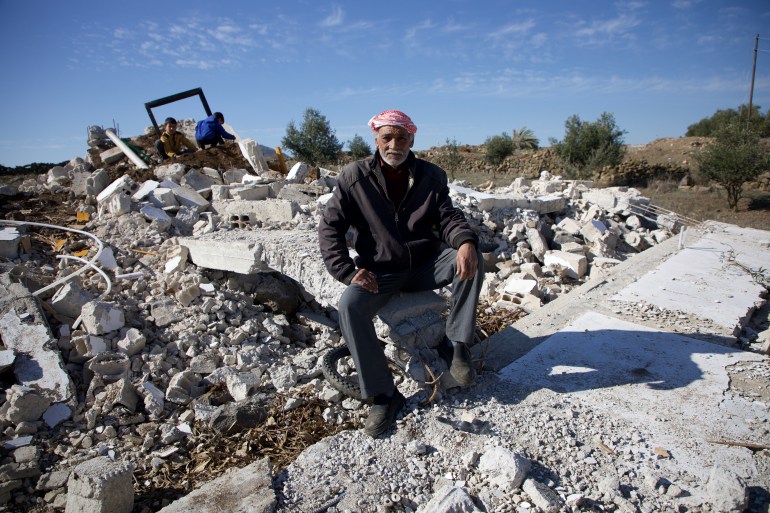Quneitra, Syria – Ibrahim al-Dakheel, 55, watched in despair as an Israeli bulldozer demolished his 40-year-old home, claiming it was necessary to secure borders.
“It was 6:30am when I heard the explosion,” he told Al Jazeera, pointing to the spot where a Syrian military post once stood near his destroyed house.
He and his family live in al-Rafid, a village in the Quneitra governorate.
Al-Dakheel used to sit in his front yard, enjoying the lush green fields and a flowing spring nearby. Nothing brought him greater joy, he said.
But now, he and his family are seeking refuge at his parents’ house in the village while he continues to watch Israeli forces advance.
“I saw them moving through the village – trucks and tanks arrived at the town hall along with bulldozers,” he said.
On December 8, Israel launched a military campaign targeting sites across Syria and advancing into Quneitra under the pretext of searching for weapons and collaborators with the Lebanese group Hezbollah and Iran.
Israeli forces set up checkpoints, uprooted trees, and destroyed the village’s only military post, which al-Dakheel said was merely a small station housing a few officers.
Israeli forces have also fired stun grenades, tear gas and live bullets at demonstrators unhappy at their encroachment into Syria.
The most recent incident came on Wednesday when Israeli forces fired on a protest against their destruction of several structures in two Quneitra villages and injured three people.
Israel’s incursion comes after Syria’s longtime autocratic president, Bashar al-Assad, was toppled by a lightning opposition offensive earlier in December.
Days later, Israel’s Prime Minister Benjamin Netanyahu said Israel’s presence in Syria would be “temporary”, yet he later clarified that Israel would illegally remain on Syrian soil until a new security arrangement is reached with Syria’s new authority.

A new displacement
Maysoun al-Faouri, 47, was not expecting to be uprooted from her home when Israeli forces advanced into her village.
During Syria’s 13-year-civil war, which began as a popular uprising against al-Assad that he brutally repressed, al-Faouri, her six children and her husband – who passed away two months ago from unknown causes – were uprooted from the al-Hajar al-Aswad neighbourhood, a suburb of Damascus.
They moved to Madinat al-Baath, an area in Quneitra where Israeli forces are now stationed just a kilometre (0.6 miles) away.
Al-Faouri isn’t completely trusting of Israel’s claims that their presence is temporary and is worried that Israeli soldiers could be in her home in seconds.
“I told my children: ‘If you want to escape, you can, but I don’t care if I die.’ I don’t even have the money to leave. We are all exhausted, poor and have lost everything,’” al-Faouri, a nurse, told Al Jazeera.

“Even the soldiers don’t know how long they’ll stay here,” she added.
Some people, al-Faouri said, may prefer to stay in villages that Israel has invaded because they do not have the financial means to leave.
A history of occupation and fear
Quneitra sits in the Golan Heights, a Syrian territory that Israel invaded and occupied during the 1967 war.
After Israel’s withdrawal in 1974 from most of the territory it had occupied – while illegally retaining some of the Golan Heights – and the declaration of a demilitarised zone under UN supervision, the area remained largely neglected.

Today, many inhabitants continue to face uncertainty despite expressing hope that the country will recover from the devastation of the conflict.
But Israel’s expanding and seemingly indefinite occupation of Syrian territory is already crushing some people’s optimism, according to 28-year-old lawyer Mohammad al-Fayyad.
“There is fear, and a lack of water, electricity, and food [in Quneitra’s villages]. Schools are closed, unlike in other provinces.
“People who fled to Damascus after Israeli forces advanced found no shelters and no help,” al-Fayyad said.
Those who have chosen to stay fear Israel’s aggression, especially if they protest its ongoing assault on the country.
Many Syrians, like al-Fayyad, worry Israel will find a new pretext to confiscate more Syrian land in the name of “security”.
“We were celebrating victory and al-Assad’s fall, but then the occupation arrived, creating fear and spoiling the joy,” al-Fayyad said regretfully.
“We are in a new stage … liberation. We should be able to celebrate like the rest of the country.”
